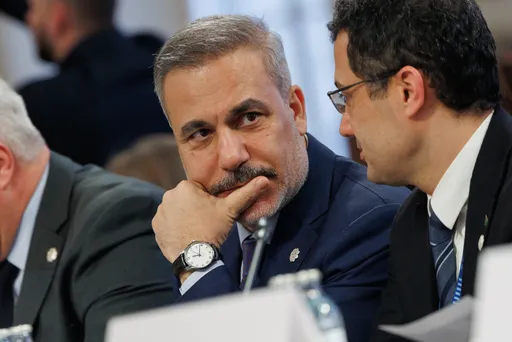US President Joe Biden has pledged to defend the Philippines from any attack in the South China Sea, as he hosted the first joint summit with Tokyo and Manila amid growing tensions with Beijing.
"The United States' defense commitments to Japan and to the Philippines are ironclad," Biden said as he met Philippines President Ferdinand Marcos and Japanese Prime Minister Fumio Kishida on Thursday.
The summit at the White House comes amid repeated confrontations between Chinese and Philippine vessels in the waterway that have raised fears of wider conflict.
"Any attack on Philippine aircraft, vessels or armed forces in the South China Sea would invoke our mutual defense treaty," added Biden.
China lays its claim on the entirety of the South China Sea, brushing aside competing claims from several Southeast Asian nations including the Philippines.
As they met around a horseshoe-shaped wooden table in the grand East Room of the US presidential residence, the US, Japanese and Philippine leaders hailed the meeting as "historic."
"We express our serious concerns about the People's Republic of China's (PRC) dangerous and aggressive behavior in the South China Sea," according to a joint statement by the three leaders after the historic meeting.
The leaders painted their alliance as a bedrock of peace and democracy in the Asia-Pacific region.
Marcos, seen as closer to Washington, said they shared an "unwavering commitment to the rules-based international order."
Kishida said that "multi-layered cooperation is essential" and that "today's meeting will make history."
Biden, 81, also held separate talks with Marcos, 66, the son and namesake of the country's former dictator.
'Self-doubt'
The joint summit came a day after Biden hosted a lavish state visit for Japan's Kishida during which he unveiled a historic upgrade in defense ties aimed at countering a resurgent China.
This time directly warning of risks from the rise of China, Kishida said that Japan —stripped of its right to a military after World War II — was determined to do more to share responsibility with its ally the United States.
The United States, Japan and the Philippines are expected to announce new joint naval exercises along with Australia, similar to drills they had in the region at the weekend, officials said.
They are also set to unveil new economic cooperation measures.
China's reaction
China hit back, saying the United States and Japan had "smeared" its reputation during Kishida's state visit.
Beijing's Foreign Ministry spokeswoman Mao Ning said Washington and Tokyo had "attacked China on Taiwan and maritime issues, grossly interfered in China's internal affairs, and seriously violated the basic norms governing international relations."
The United States has a mutual defence pact with Manila but there are fears it could be put to the test, with tensions becoming particularly acute around the Second Thomas Shoal, a remote reef in the Spratly Islands.
Japan and the Philippines are the latest Asia-Pacific allies to be hosted by Biden, who was joined by Kishida and South Korean President Yoon Suk-yeol at Camp David in August.
But Biden has also moved to manage tensions with China, holding a two-hour phone call with President Xi Jinping last week following a face-to-face meeting in San Francisco in November.
On Wednesday Biden said the major upgrade in defence ties with Japan was "purely defensive" and "not aimed at any one nation or a threat to the region."
























